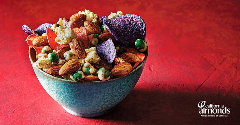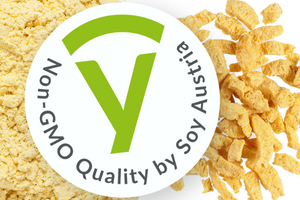Mintel: Asia Pacific also embracing non-animal protein
18 Apr 2018Mintel reveals that as many as two in five (39%) urban Indonesians and one in three (34%) urban Thais consumed more non-animal sources of protein (e.g. plant, dairy, grains) in 2017, compared to the previous year.

It seems the widespread move away from meat is not only happening in Europe or the US, but also in Asia Pacific. New research from global market intelligence agency Mintel reveals that as many as two in five (39%) urban Indonesians and one in three (34%) urban Thais consumed more non-animal sources of protein (e.g. plant, dairy, grains) in 2017, compared to the previous year.
While still in early stages, this trend has also infiltrated meat-loving Australia. Indeed, 16% of urban Australians said they avoided or intended to avoid red meat in 2017, while one in five (19%) consumed more non-animal sources of protein. Of those who avoided or planned to avoid red meat, half (51%) said that they believe it was healthier if they did so.Michelle Teodoro, Global Food Science and Nutrition Analyst, at Mintel said: “Traditional agriculture is unable to meet the protein needs of the world. The current levels of demand for meat supplies globally, and the relative growth of meat production on this scale will have a significant, negative impact on the environment. At the same time, more and more consumers are moving away from meat and looking towards alternative sources of protein instead, offering some relief and creating new opportunities in the global consumer marketplace.”“Pressure on the natural environment is forcing consumers and companies to rethink what they take and make. Meanwhile, new technologies are redefining how we create and use food and drink. While developments that engineer rather than harvest food and drink staples, such as laboratory-grown meat, have grabbed headlines, the resulting products are still years away from mass commercial availability. This showcases the potential for more innovative, sustainable and alternative protein sources. The world is changing and food scientists have a big role to play in the future of food. Companies and brands should be looking across industries for inspiration and opportunities for collaboration with scientists and food engineers,” Teodoro added.Mintel research shows that one in four (24%) urban Indonesians planned to follow a plant-based/vegetarian diet in 2017, while 61% of urban Thais and over half (54%) of urban Australians planned to eat more vegetables/fruits. Furthermore, nutritious or health-related reasons (56%) are the top factor influencing urban Thai consumers when choosing food or drink products to buy.“With high animal protein intake associated with health concerns, any reduction in consumption will have positive health outcomes. Today’s consumers are also starting to include more vegetables and fruits in their diets, or adopting plant-based or vegetarian diets, given the numerous health benefits that come along with them. Along with a shift to plant and lab-based proteins, the world’s reliance on factory-farmed animals will also be reduced—contributing to animal welfare globally,” Teodoro continued.This is all reflected in Mintel Trend ‘Hungry Planet’ which discusses how consumer purchasing decisions are being influenced by issues surrounding sustainability and ethics, as well as Mintel Trend ‘Bannedwagon’ which details how consumers are focusing on ingredients and production methods, embracing once-niche ways of living and eating.Delon Wang, Trends Manager, Asia Pacific, at Mintel concluded: “Moving forward, we will see aspects of environmentalism penetrate various lifestyle goals. With the mantra ‘you are what you eat’ top of mind today, consumers are assessing their lifestyle, everyday purchases and surroundings. Additionally, the idea of inclusivity and accepting niche lifestyles of global consumers has popularised, to a certain extent. We are seeing more understanding about unique diets and living habits, creating new guidelines to live as the benefits are exhorted.”Related news

‘Super nut’? Indonesia’s ‘best kept secret’ wins EU novel food approval
6 Dec 2022
A previously obscure, nutrient-rich Indonesian nut is set to hit European shelves after winning EU novel foods approval that could also help protect under-threat kenari forests on the archipelago.
Read more
Create the perfect sensory experience with 100% natural texturizers
11 Nov 2022
To fulfill the growing consumers’ expectations for flavorful traditional and plant-based foods and beverages, Nexira introduces naltive locust bean gum, a complete range of premium and performing texturizing locust bean gum grades.
Read more
Superfood shots: Nigerian startup creates ginger-based drinks to boost health
2 Nov 2022
Nigerian startup, Futurefood Tech makes ginger-based shots to boost health and wellbeing using all natural ingredients, herbs and spices such as black pepper, beetroot, and cayenne pepper that give a nutritional boost to the typically starch-heavy Nige...
Read more
The natural power of almonds
27 Oct 2022
Rich in nutrients and antioxidant properties, this powerful and versatile seed carries benefits for gastric metabolism, heart health and even diabetics.
Read more
SOY AS A VALUABLE FOOD INGREDIENT
27 Oct 2022
Your leading partner for individual NATURAL SOYLUTIONS
Read more
US consumers make a beeline for honey-sweetened products
4 Oct 2022
Honey-sweetened products are enjoying rising demand amongst US consumers, perceived as an all-natural product, according to recent USDA figures.
Read more
Healthy eating guidelines could help EU hit the methane reduction targets
1 Jul 2022
National healthy eating guidelines calling for 50% cut in red meat and 25% drop in dairy consumption could be key for the European Union (EU) to meet its 2030 methane reduction targets, according to the Changing Markets Foundation.
Read more
Nitrite and nitrate alternatives gain ground for processed meat applications
14 Jun 2022
As France finalises its review into the health risks of nitrite in cured meats, industry research focuses on the potential substitutes for nitrite and nitrate in processed meats to offer consumers healthy alternatives.
Read more
Consumers seek ashwagandha-fueled relaxation in beverages
28 Mar 2022
Ashwagandha has been used in India for centuries, and it is only in recent years that consumers in the US and now Europe are realising its health benefits, with manufacturers starting to add this adaptogen to beverage formulations.
Read more
Does the home baking boom have longevity?
15 Mar 2022
After years of decline, home baking mixes experienced a boom during the Covid-19 pandemic. With the right positioning and claims, such as clean label and plant-based, brands can continue to leverage the trend for home baking.
Read more